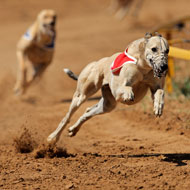Multi-million pound deal to boost greyhound welfare

The agreement is expected to boost income to the British Greyhound Racing fund to around £10 million a year.
Greyhound welfare is set to be improved thanks to a multi-million pound deal with a number of online bookmakers.
On Thursday (10 January), sports minister Mims Davies announced that £3 million pounds of voluntary funding will contribute towards new tailored training for vets and an injury recovery scheme.
He also said the funding will go towards improving racetrack safety, the supply of more retirement homes, kennel improvements and the provision of air condition for trainers’ vehicles.
Welcoming the announcement, Battersea Dogs & Cats Home’ deputy chief executive Peter Laurie said: “Battersea has long been calling for the betting industry, which profits very considerably from greyhound racing, to pay its fair share towards protecting the welfare of the dogs themselves, including to ensure they are responsibly re-homed on their retirement from racing.
“We welcome this new announcement by the minister for sport and this commitment from some of Britain’s biggest betting organisations. But we note that this is only a voluntary arrangement and future contributions are not guaranteed.
“Battersea, therefore, renews its call for the existing voluntary levy to be made compulsory and for greyhound welfare to be properly funded on a sustainable basis.”
The agreement took effect from 1 January 2019 and is expected to boost income to the British Greyhound Racing fund (BGRF) to around £10 million a year. Among the bookmakers that have made a commitment to the extra payments include Betfred, William Hill and Sky Betting.
Joe Scanlon, chairman of the British Greyhound Racing Fund, said: “With this deal, the BGRF will be close to full support from all the major retail and online operators and it will provide a firm basis for delivering the enhanced welfare and integrity provision the sport of greyhound racing expects.
“This agreement would not have been possible without the support of the Minister and her team at DCMS, Lord Lipsey who has worked tirelessly to improve the welfare of greyhounds over many years and of course the major bookmakers for their continued support of the Fund.”



 The veterinary mental health charity Vetlife is inviting the veterinary community to join it for a sponsored cold-water dip.
The veterinary mental health charity Vetlife is inviting the veterinary community to join it for a sponsored cold-water dip.